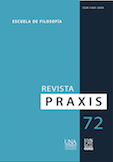Marxism and science fiction
DOI:
https://doi.org/10.15359/praxis.72.5Keywords:
Social Philosophy, Novum, Cognitive EstrangementAbstract
This article analyzes the relation between Marxism and science fiction around the con- cept of novum and the process of cognitive estrangement, which define science fiction. This article studies the theory and practice of science fiction, so long as science fiction is a manifestation of the critical theory and, therefore, as a part of an ontology of congruence and of the social critique. Also, it is established a critique of the current science fiction what is linked to Neoliberalism and to the pedagogical project of World Bank.
References
Alfaro, R. (2005). Sociología dialéctica de la literatura: cuestión de método. Revista de Ciencias Sociales, III-IV(109-110), 151-156.
Alfaro, R. (2007). Antropologías literarias: prolegómenos a la praxis textual. Praxis 59, 7-17.
Alfaro, R. (2008). El rol de los modelos mentales espaciales en la aprehensión literaria. Revista de Ciencias Sociales, III(121), 167-178.
Alfaro, R. (2011a). Tiempo y espacio como ideología. Praxis 66, 145-154.
Alfaro, R. (2011b). Modelos mentales tempo-espaciales. Revista de Ciencias Sociales, III- IV(133-134), 13-22.
Alfaro, R. (2013). La ficción de Iván Molina Jiménez. Letras 53, 201-217.
Alfaro, R. (2014a). Post-postmodernismo. Reflexiones 93 (2), 103-113.
Alfaro, R. (2014b). El novum en la ciencia ficción costarricense. Revista de Filología y Lingüística, 40(1), 129-140.
Barceló-García, M. (2005). Ciencia y ciencia ficción. Revista Digital Universitaria, 6(7), 1-10.
Besson, L. (Director). (2014). Lucy. Universal Pictures y Canal+.
Bloch, E. (1970). Entfremdung, Verfremdung: Alienation, Estrangement. The Drama Review: TDR, 15(1), 120-125.
Blomkamp, N. (Director). (2013). Elysium. TriStar Pictures, Sony Pictures Entertainment (SPE), Media Rights Capital, QED International, Simon Kinberg Productions.
Brown, P. & Hugh, L. (2010). Economic globalisation, skill formation and the consequenc- es for higher education. In Michael W. Apple, Stephen J. Ball and Luis Armando Gandin (eds.). The Routledge International Handbook of the Sociology of Education. Pp. 229-240. Londres and Nueva York: Routledge.
Burling, W. J. (2009). Marxism. In Mark Bould, Andrew M. Butler, Adam Roberts and Sherryl Vint (eds.). The Routledge Companion to Science Fiction. Pp. 236-245. London and New York: Routledge.
Cahill, M. (Director). (2014). I Origins. Verisimilitude/WeWork Studio/Bersin Pictures.
Csicsery-Ronay, I. Jr. (2003). Marxist theory and science fiction. In Edward James and Farah Mendlesohn (eds.). The Cambridge Companion to Science Fiction. Pp. 113-124. Nueva York: Cambridge University Press.
Csicsery-Ronay, I. Jr. (2009). Empire. In: Mark Bould, Andrew M. Butler, Adam Roberts y Sherryl Vint (eds.). The Routledge Companion to Science Fiction. Pp. 362-372. Londres y Nueva York: Routledge.
Csicsery-Ronay, I. Jr. (2011). The Seven Beauties of Science Fiction. Middletown, Connecticut: Wesleyan University Press.
Eizykman, B. (1975). On Science Fiction. Science Fiction Studies, 2(2), 164-166.
Eizykman, B. (1983). Chance and Science Fiction: SF as Stochastic Fiction. Science Fiction Studies, 10(1), 24-34.
Eizykman, B. (1985). Temporality in Science-Fiction Narrative. Science Fiction Studies, 12(1), 66-87.
Favier, J. (1972). Les jeux de la temporalité en science-fiction. Littérature. 8, 53-71.
Fitting, P. (2010). Utopia, Dystopia and Science Fiction. In Gregory Claeys (ed.). The Cambridge Companion to Utopian Literature. Pp. 135-153. Nueva York: Cambridge University Press.
Freedman, C. (1987). Science Fiction and Critical Theory. Science Fiction Studies, 14(2), 180-200.
Fuchs, C. (2014). Karl Marx y el estudio de los medios y la cultura hoy. Telos. Revista de Estudios Interdisciplinarios en Ciencias Sociales, 16(3), 495-535.
Gaskin, R. (2013). Language, Truth, and Literature. A Defense of Literary Humanism. Oxford: Oxford University Press.
Glazer, J. (Director) (2013). Under the Skin. Film4.
Gomel, E. (2014). Narrative Space and Time. Representing Impossible Topologies in Literature. Nueva York and Londres: Routledge.
Gomes-Maluf, M. y Robinson de Souza, A. (2008). A ficção científica e o ensino de ciências: o imaginário como formador do real e do racional. Ciência & Educação, 14(2), 271-282.
Haywood, R. (2011). The Emergence of Latin American Science Fiction. Middletown, CT: Wesleyan University Press.
Hewlett, D. (Director) (2014). Debug. Copperheart Entertainment.
Hogan, W. D. (Director) (2014). Zodiac: Signs of the Apocalypse. SyFy Original Movies/ Cinetel Films/Reel One Pictures.
Kojève, A. (2013). ¿Qué es la dialéctica? Revista de Ciencias Sociales. I(139) 91-102.
Lang, F. (Director) (1927). Metropolis. U.F.A.
Lem, S. (1973). On the Structural Analysis of Science Fiction. Science Fiction Studies, 1(1), 26-33.
Luokkala, B. B. (2014). Exploring Science Through Science Fiction. New York, Heidelberg, Dordrecht, London: Springer.
Niccol, A. (Director) (2011). In Time. Regency Enterprises, New Regency Pictures, Strike Entertainment.
Nolan, C. (Director) (2014). Interstellar. Warner Bros. Pictures/Syncopy/Paramount Pictures/Legendary Pictures/Lynda Obst Productions.
Petit, M. F. y Solbes, J. (2012). La ciencia ficción y la enseñanza de las ciencias. Enseñanza de las Ciencias. Revista de Investigación y Experiencias Didácticas, 30(2), 69-86.
Pfister, W. (Director). (2014). Trascendence. Warner Bros. Pictures/Alcon Entertainment.
Piassi, L. y Pietrocola, M. (2009). Ficção científica e ensino de ciências: para além do método de ‘encontrar erros em filmes’. Educação e Pesquisa, 35(3), 525-540.
Renault, G. (1980). Science Fiction and Cognitive Estrangement: Darko Suvin and the Marxist Critique of Mass Culture. Discourse 2, 113-141.
Smyth, J. (2011). Critical Pedagogy for Social Justice. New York: Continuum.
Spiegel, S. (2006). Der Begriff der Verfremdung in der Science-Fiction-Theorie. Ein Klärungsversuch. Quarber Merkur. Franz Rottensteiners Literaturzeitschrift für Science Fiction und Phantastik 103/104, 13-40.
Spiegel, S. (2013). Science Fiction. In Markus Kuhn, Irina Sheidgen y Nicola Valeska Weber. Filmwissenschaftliche Genreanalyse. Eine Einführung. Pp. 245-265. Berlin/Boston.
Spring, J. (2006). Pedagogies of Globalization. The Rise of the Educational Security State. Mahwah, New Jersey: Lawrence Erlbaum Associates.
Spring, J. (2009). Globalization of Education. New York y London: Routledge.
Suvin, D. (1972). On the Poetics of Science Fiction. College English, 34(3), 372-382.
Suvin, D. (1973). La science-fiction et la jungle des genres un voyage extraordinaire. Littérature 10, 98-113.
Suvin, D. (1979). Metamorphoses of Science Fiction. On the Poetics and History of a Literary Genre. New Haven and Londres: Yale University Press.
Suvin, D. (2000). Afterword. In Patrick Parrinder (ed.). Learning from Other Worlds. Estrangement, Cognition and the Politics of Science Fiction and Utopia. Pp. 233-271. Liverpool: Liverpool University Press.
Zajda, J. (2010). Globalisation, Ideology and Education Policy Reforms. In Joseph Zajda (ed.). Globalisation, Ideology and Education Policy Reforms. Pp. xii-xxii. Dordrecht, Heidelberg, London, New York: Springer.
Zgorzelski, A. (1979). Is Science Fiction a Genre of Fantastic Literature? Science Fiction Studies, 6(3), 296-303.
Žižek, S. (2014a). Event. A Philosophical Journey Through a Concept. Brooklyn and Londres: Melville House.
Žižek, S. (2014b). Absolute Recoil. Towards a New Foundation of Dialectical Materialism. Londres and Nueva York: Verso.

Downloads
Published
How to Cite
Issue
Section
License
La revista trabaja bajo la Licencia Creative Commons Atribución-NoComercial-CompartirIgual 4.0 Internacional; apartir de la publicación número 79 (2019); en publicaciones anteriores se trabajaba bajo una Licencia Atribución- No Comercial- Sin Derivadas 4.0 Internacional.







